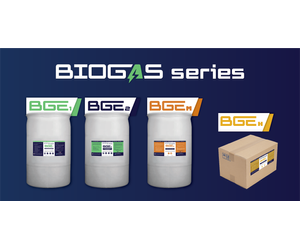


Biogas Series - Organic Waste to Clean Energy
Our Biogas Series stands out for its ability to transform organic waste into renewable energy. With a firm dedication to sustainable energy practices, our advanced microbial formulations are specifically engineered to optimize the process of biogas production. We are turning waste management into a powerful source of energy for a greener tomorrow. Waste-to-clean energy processes generate renewable energy, which helps diversify the energy supply and mitigate climate change. Our products empower clients to improve waste management and increase biogas production, a financially viable alternative to traditional waste disposal and reliable and efficient energy generation. By choosing the Biogas Series, you're not only investing in advanced technology but also contributing to a more sustainable and environmentally friendly future. Join us in our mission to turn waste into a valuable resource and power a greener world.Most popular related searches
clean energy
waste-to-energy
biogas production optimization
biogas production
renewable energy
energy production
organic waste-to-energy
biogas generation
biogas generator
energy output
- Increase Methane Yield by up to 7% - Higher methane concentration means greater energy production and more revenue per cubic meter of biogas generated.
- Reduce Hydrogen Sulfide (H₂S) by up to 75% - Lower H₂S levels minimize corrosion, extend the life of gas scrubbers and engines, and significantly reduce maintenance and replacement costs.
- Accelerate Reactor Startup and Stabilization - Faster stabilization of the digester leads to quicker energy production and shorter downtime during commissioning or feedstock transitions.
- Maximize Digester Throughput and Capacity - Improved solids breakdown increases effective digester volume, enabling higher feedstock loading without costly expansions or retrofits.
- Extend the Lifespan of Critical Infrastructure - Reducing biological stress, foaming, and solids buildup protects reactors, mixers, and gas systems — delaying major capital expenditures.
- Lower Chemical and Additive Costs - Natural biological control of foaming, solids, and H₂S decreases the need for chemical defoamers, flocculants, or iron salts — cutting operating expenses.
- Improve Overall Plant Efficiency and Profitability - Optimized digestion means more biogas, lower downtime, lower maintenance, and higher energy output — improving both EBITDA margins and long-term asset value.




